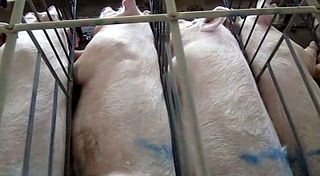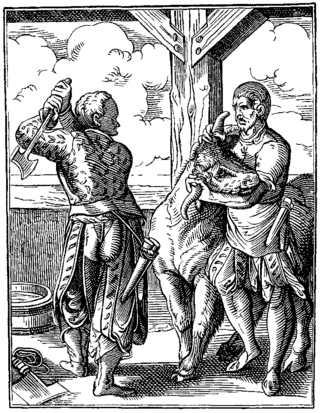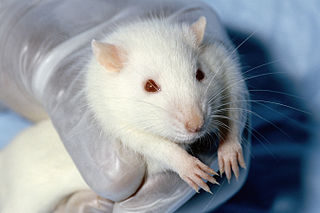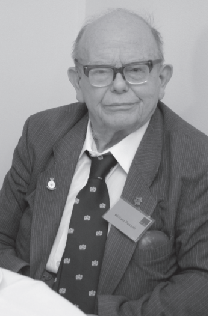Related Research Articles

Animal welfare is the well-being of non-human animals. Formal standards of animal welfare vary between contexts, but are debated mostly by animal welfare groups, legislators, and academics. Animal welfare science uses measures such as longevity, disease, immunosuppression, behavior, physiology, and reproduction, although there is debate about which of these best indicate animal welfare.

The Animal Welfare Act was signed into law by President Lyndon B. Johnson on August 24, 1966. It is the main federal law in the United States that regulates the treatment of animals in research and exhibition. Other laws, policies, and guidelines may include additional species coverage or specifications for animal care and use, but all refer to the Animal Welfare Act as the minimally acceptable standard for animal treatment and care. The USDA and APHIS oversee the AWA and the House and Senate Agriculture Committees have primary legislative jurisdiction over the Act. Animals covered under this Act include any live or dead cat, dog, hamster, rabbit, nonhuman primate, guinea pig, and any other warm-blooded animal determined by the Secretary of Agriculture for research, pet use or exhibition. Excluded from the Act are birds, rats of the genus Rattus, mice of the genus Mus, farm animals, and all cold-blooded animals.

A gestation crate, also known as a sow stall, is a metal enclosure in which a farmed sow used for breeding may be kept during pregnancy. A standard crate measures 6.6 ft x 2.0 ft.

Animal slaughter is the killing of animals, usually referring to killing domestic livestock. It is estimated that each year, 80 billion land animals are slaughtered for food. Most animals are slaughtered for food; however, they may also be slaughtered for other reasons such as for harvesting of pelts, being diseased and unsuitable for consumption, or being surplus for maintaining a breeding stock. Slaughter typically involves some initial cutting, opening the major body cavities to remove the entrails and offal but usually leaving the carcass in one piece. Such dressing can be done by hunters in the field or in a slaughterhouse. Later, the carcass is usually butchered into smaller cuts.

Animal testing regulations are guidelines that permit and control the use of non-human animals for scientific experimentation. They vary greatly around the world, but most governments aim to control the number of times individual animals may be used; the overall numbers used; and the degree of pain that may be inflicted without anesthetic.
Michael Calvert Appleby OBE is a British ethologist and animal welfare scientist, especially for farm animals. He obtained a BSc in Zoology at the University of Bristol and a PhD in Animal Behaviour at King's College, Cambridge. He then spent 20 years at the Poultry Research Centre in Scotland and the University of Edinburgh researching behaviour, husbandry, and welfare of farm animals. He worked for World Animal Protection from 2005 to 2016, and is now retired.

Pain negatively affects the health and welfare of animals. "Pain" is defined by the International Association for the Study of Pain as "an unpleasant sensory and emotional experience associated with actual or potential tissue damage, or described in terms of such damage." Only the animal experiencing the pain can know the pain's quality and intensity, and the degree of suffering. It is harder, if even possible, for an observer to know whether an emotional experience has occurred, especially if the sufferer cannot communicate. Therefore, this concept is often excluded in definitions of pain in animals, such as that provided by Zimmerman: "an aversive sensory experience caused by actual or potential injury that elicits protective motor and vegetative reactions, results in learned avoidance and may modify species-specific behaviour, including social behaviour." Nonhuman animals cannot report their feelings to language-using humans in the same manner as human communication, but observation of their behaviour provides a reasonable indication as to the extent of their pain. Just as with doctors and medics who sometimes share no common language with their patients, the indicators of pain can still be understood.

Harlan Sprague Dawley Inc. was a supplier of animals and other services to laboratories for the purpose of animal testing. It provided pre-clinical research tools and services for the pharmaceutical, biotechnology, agrochemicals, industrial chemical, and food industries.
Animal welfare science is the scientific study of the welfare of animals as pets, in zoos, laboratories, on farms and in the wild. Although animal welfare has been of great concern for many thousands of years in religion and culture, the investigation of animal welfare using rigorous scientific methods is a relatively recent development. The world's first Professor of Animal Welfare Science, Donald Broom, was appointed by Cambridge University (UK) in 1986.
John J. McGlone is an American animal scientist and a Frank Guggenheim Fellow, Institutional Official Director and professor of Animal Science at Texas Tech University.

The Three Rs (3Rs) are guiding principles for more ethical use of animals in product testing and scientific research. They were first described by W. M. S. Russell and R. L. Burch in 1959. The 3Rs are:
- Replacement:methods which avoid the use of animals in research
- Reduction: use of methods that enable researchers to minimise the number of animals necessary to obtain reliable and useful information.
- Refinement: use of methods that alleviate or minimize potential pain, suffering, distress, or lasting harm and improve welfare for the animals used.

The Humane Slaughter Association (HSA) supports research, training, and development to improve the welfare of livestock during transport and slaughter. It provides technical information about handling and slaughter on its website, training for farmer staff and vets, advice to governments and industry, and funding of science and technology to make slaughter more humane. HSA is the sister charity to Universities Federation for Animal Welfare.

Pain is an aversive sensation and feeling associated with actual, or potential, tissue damage. It is widely accepted by a broad spectrum of scientists and philosophers that non-human animals can perceive pain, including pain in amphibians.

William Moy Stratton Russell, also known as Bill Russell, was a British zoologist and animal welfare worker. He was best known for writing, along with R. L. Burch (1926-1996) The Principles of Humane Experimental Technique (1959), a landmark in the humane use of animals in research, education and testing. Russell and Burch introduced the concept of the Three Rs in the scientific community and provided a blueprint for combining animal welfare considerations and quality of research.

Christopher M. Sherwin was an English veterinary scientist and senior research fellow at the University of Bristol Veterinary School in Lower Langford, Somerset. He specialised in applied ethology, the study of the behaviour of animals in the context of their interactions with humans, and of how to balance the animals' needs with the demands placed on them by humans.

Jane Louise Hurst is the William Prescott Professor of Animal Science at the University of Liverpool. She is Head of Mammalian Behaviour & Evolution. She studies scent communication between mammals, as well as animal welfare and pest control. She served as the president of the Association for the Study of Animal Behaviour from 2010 to 2012.
Alison Jane Hanlon is an Irish veterinary research scientist who advocates for animal welfare, including that of companion animals, horses and farm animals. She is a professor at University College Dublin and has worked on a number of government advisory groups.

Major Charles Westley Hume OBE MC BSc was a British animal welfare worker and writer. He was the founder of the University of London Animal Welfare Society (ULAWS).

The European Convention for the Protection of Vertebrate Animals used for Experimental and other Scientific Purposes, sometimes simply referred to as the animal experimentation convention or laboratory animals convention, is an animal welfare treaty of the Council of Europe regarding animal testing, adopted on 18 March 1986 in Strasbourg, and effective since 1 January 1991.
References
- ↑ The Black Pig Design Co Ltd, The Sty, 47 Upper King St, Royston, SG8 9AZ, 01763 222 333. "UFAW - Universities Federation for Animal Welfare - Founded 1926". ufaw.org.uk.
{{cite web}}: CS1 maint: multiple names: authors list (link) CS1 maint: numeric names: authors list (link) - ↑ Yeates, James (2013). Animal Welfare in Veterinary Practice. Wiley-Blackwell. ISBN 978-1-4443-3487-6.
- ↑ "Universities Federation for Animal Welfare". fao.org. Retrieved 29 January 2014.
- ↑ "Universities' Federation for Animal Welfare". Nature. 149 (3778): 353–354. March 1942. Bibcode:1942Natur.149T.353.. doi:10.1038/149353d0. PMC 1581699 . PMID 20323107.
- ↑ The Black Pig Design Co Ltd, The Sty, 47 Upper King St, Royston, SG8 9AZ, 01763 222 333. "UFAW - Universities Federation for Animal Welfare - Grants & Awards". ufaw.org.uk.
{{cite web}}: CS1 maint: multiple names: authors list (link) CS1 maint: numeric names: authors list (link) - 1 2 Harding EJ, ES Paul and M Mendl (2004) Animal behaviour: cognitive bias and affective state. Nature 427(6972):312–312
- 1 2 Sherwin CM (2003) Social context affects the motivation of laboratory mice, Mus musculus, to gain access to resources. Animal behaviour 66(4):649-655
- ↑ Mason G, R Clubb, NR Latham and S Vickery (2007) Why and how should we use environmental enrichment to tackle stereotypic behaviour? Applied Animal Behaviour Science 102(3):163–188
- ↑ Latham NR and GJ Mason (2008) Maternal deprivation and the development of stereotypic behaviour. Applied Animal Behaviour Science 110(1):84–108
- 1 2 Mettam JJ, LJ Oulton, CR McCrohan and LU Sneddon (2011) The efficacy of three types of analgesic drugs in reducing pain in the rainbow trout, Oncorhynchus mykiss. Applied Animal Behaviour Science 133(3):265–274
- 1 2 Gaskill BN, SA Rohr, EA Pajor, JR Lucas and JP Garner (2009) Some like it hot: mouse temperature preferences in laboratory housing. Applied Animal Behaviour Science 116(2):279-285
- 1 2 Gaskill BN, CJ Gordon, EA Pajor, JR Lucas, JK Davis and JP Garner (2012) Heat or insulation: behavioral titration of mouse preference for warmth or access to a nest. PLoS ONE 7(3):e32799
- ↑ Packer RMA, A Hendricks and CC Burn (2012) Do dog owners perceive the clinical signs related to conformational inherited disorders as' normal' for the breed? A potential constraint to improving canine welfare. Animal Welfare 21(Supplement 1): 81-93
- ↑ Bourke, Joanna (2022). "'Man versus Rabbits'". Birkbeck: 200 Years of Radical Learning for Working People. Oxford University Press. pp. 286–303. doi:10.1093/oso/9780192846631.001.0001. ISBN 978-0192846631.
- 1 2 "Wild Animal Control". Universities Federation for Animal Welfare. 2024. Archived from the original on 5 December 2024.
- ↑ "Man versus Rabbit". Nature. 135: 207. 1935. doi:10.1038/135207a0.
- ↑ Worden AN (1947) The UFAW handbook on the care and management of laboratory animals; with an appendix on statistical analysis. Universities Federation for Animal Welfare: London, UK
- ↑ Hubrecht R and JK Kirkwood (Eds.) (2010) The UFAW handbook on the care and management of laboratory and other research animals. Wiley-Blackwell
- ↑ The Black Pig Design Co Ltd, The Sty, 47 Upper King St, Royston, SG8 9AZ, 01763 222 333. "genetic welfare problems". ufaw.org.uk.
{{cite web}}: CS1 maint: multiple names: authors list (link) CS1 maint: numeric names: authors list (link) - ↑ The Black Pig Design Co Ltd, The Sty, 47 Upper King St, Royston, SG8 9AZ, 01763 222 333. "UFAW - Universities Federation for Animal Welfare - Founded 1929". ufaw.org.uk.
{{cite web}}: CS1 maint: multiple names: authors list (link) CS1 maint: numeric names: authors list (link) - ↑ List of books in the UFAW Animal Welfare Series published by Wiley-Blackwell
- ↑ Russell WMS and Burch RL (1959. Reprinted 1992). The Principles of Humane Experimental Technique. Universities Federation for Animal Welfare: Wheathampstead, UK
- ↑ Fenwick NP and D Fraser (2005) The Three Rs in the pharmaceutical industry: perspectives of scientists and regulators. Animal Welfare 14:367-377
- ↑ Russell WMS (2005) The Three Rs: past, present and future. Animal Welfare 14:279-286
- 1 2 "Animal Welfare". Nature. 144: 974. 1939. doi:10.1038/144974d0.
- ↑ "University of London Animal Welfare Society". NC State University Libraries. 2024. Archived from the original on 5 December 2024.
- ↑ The Black Pig Design Co Ltd, The Sty, 47 Upper King St, Royston, SG8 9AZ, 01763 222 333. "UFAW - Universities Federation for Animal Welfare - Animal Welfare Journal". ufaw.org.uk. Archived from the original on 25 October 2013. Retrieved 19 May 2014.
{{cite web}}: CS1 maint: multiple names: authors list (link) CS1 maint: numeric names: authors list (link) - ↑ "The UFAW Journal - Animal Welfare". ufaw.org.uk. Retrieved 30 January 2024.
- ↑ "Animal Welfare". cambridge.org. Retrieved 30 January 2024.
- ↑ "Book Reviews". ufaw.org.uk. Retrieved 30 January 2024.
- ↑ Hunting With Dogs HANSARD, 18 March 2002.
- ↑ "Newsletter" (PDF). Universities Federation for Animal Welfare. 2019. Retrieved 24 January 2023.